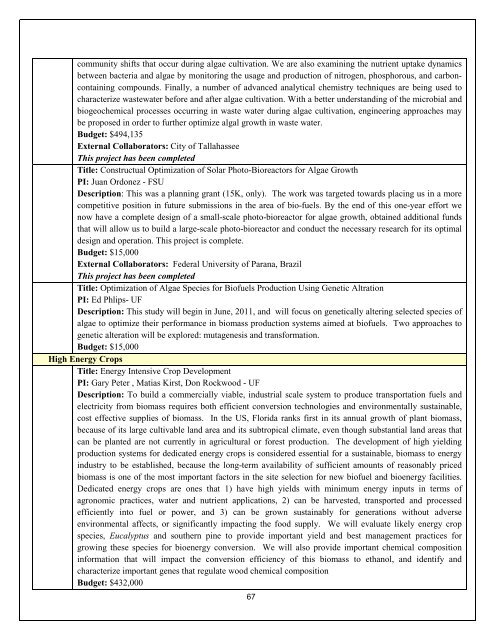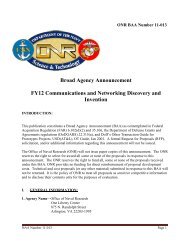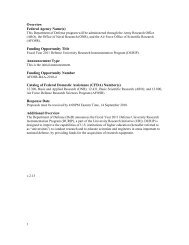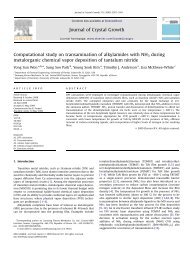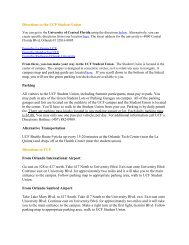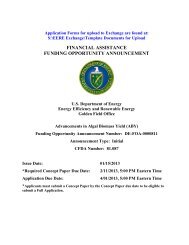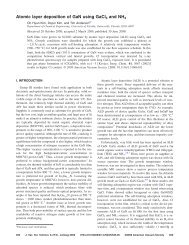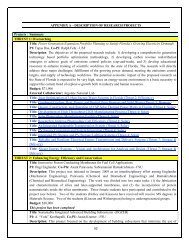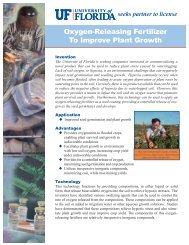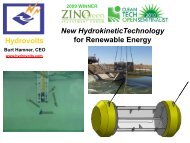Annual Report- Part III - Florida Energy Systems Consortium
Annual Report- Part III - Florida Energy Systems Consortium
Annual Report- Part III - Florida Energy Systems Consortium
You also want an ePaper? Increase the reach of your titles
YUMPU automatically turns print PDFs into web optimized ePapers that Google loves.
community shifts that occur during algae cultivation. We are also examining the nutrient uptake dynamicsbetween bacteria and algae by monitoring the usage and production of nitrogen, phosphorous, and carboncontainingcompounds. Finally, a number of advanced analytical chemistry techniques are being used tocharacterize wastewater before and after algae cultivation. With a better understanding of the microbial andbiogeochemical processes occurring in waste water during algae cultivation, engineering approaches maybe proposed in order to further optimize algal growth in waste water.Budget: $494,135External Collaborators: City of TallahasseeThis project has been completedTitle: Constructual Optimization of Solar Photo-Bioreactors for Algae GrowthPI: Juan Ordonez - FSUDescription: This was a planning grant (15K, only). The work was targeted towards placing us in a morecompetitive position in future submissions in the area of bio-fuels. By the end of this one-year effort wenow have a complete design of a small-scale photo-bioreactor for algae growth, obtained additional fundsthat will allow us to build a large-scale photo-bioreactor and conduct the necessary research for its optimaldesign and operation. This project is complete.Budget: $15,000External Collaborators: Federal University of Parana, BrazilThis project has been completedTitle: Optimization of Algae Species for Biofuels Production Using Genetic AltrationPI: Ed Phlips- UFDescription: This study will begin in June, 2011, and will focus on genetically altering selected species ofalgae to optimize their performance in biomass production systems aimed at biofuels. Two approaches togenetic alteration will be explored: mutagenesis and transformation.Budget: $15,000High <strong>Energy</strong> CropsTitle: <strong>Energy</strong> Intensive Crop DevelopmentPI: Gary Peter , Matias Kirst, Don Rockwood - UFDescription: To build a commercially viable, industrial scale system to produce transportation fuels andelectricity from biomass requires both efficient conversion technologies and environmentally sustainable,cost effective supplies of biomass. In the US, <strong>Florida</strong> ranks first in its annual growth of plant biomass,because of its large cultivable land area and its subtropical climate, even though substantial land areas thatcan be planted are not currently in agricultural or forest production. The development of high yieldingproduction systems for dedicated energy crops is considered essential for a sustainable, biomass to energyindustry to be established, because the long-term availability of sufficient amounts of reasonably pricedbiomass is one of the most important factors in the site selection for new biofuel and bioenergy facilities.Dedicated energy crops are ones that 1) have high yields with minimum energy inputs in terms ofagronomic practices, water and nutrient applications, 2) can be harvested, transported and processedefficiently into fuel or power, and 3) can be grown sustainably for generations without adverseenvironmental affects, or significantly impacting the food supply. We will evaluate likely energy cropspecies, Eucalyptus and southern pine to provide important yield and best management practices forgrowing these species for bioenergy conversion. We will also provide important chemical compositioninformation that will impact the conversion efficiency of this biomass to ethanol, and identify andcharacterize important genes that regulate wood chemical compositionBudget: $432,00067


